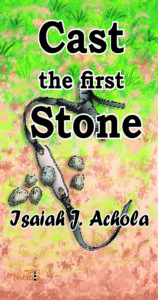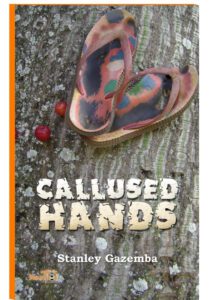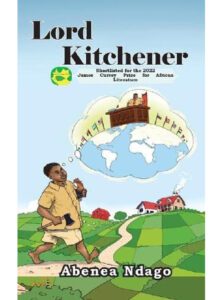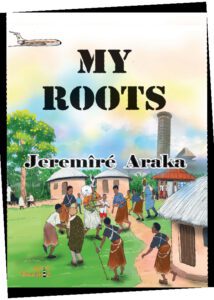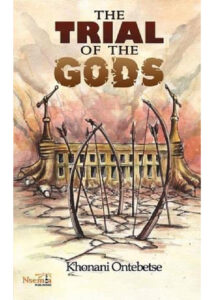
- Title: Smiles in Pathos and Other Poems
- Year: 2011
- Author: Khainga O’Okwemba
- Publisher: Nsemia Inc. Publishers, Ontario, Canada
- Reviewed on: June 7, 2014
The gentle and romantic poet in the Africa of the Second Liberation refuses to be prescriptive and instead chooses a style that is quiet and lacking in the hysteria that we see in the poetry of songsters who based their rhythms on the beats of traditional African poetry.

What we, instead, see in Khainga O’Okwemba’s surrealist poems is a narrative in which the poet lives in the unconscious, moving his poetic searchlight to Africa’s modern life, showing us what it is like to be a poet.
Typical of his romantic and sophisticated style is the poem from which he derives the title of his volume of poetry, Smiles in Pathos and Other Poems.
The book’s title is based on epiphanies that strike the poet as he walks down the dark lanes inhabited by modern humankind; it shows the interplay of vivid colours rendered in an economical use of words:
We were on a romantic picnic,
Dressed to charm another – red
For the lady, and – pink
For the man; he a playful lad
And she an outgoing lass
Smiles in Pathos
The title of this poem — and subsequently the title of the whole book — refuses to confine itself to a specific matter and instead explores the human pathos, as if to say that in life, joy and sorrow, death and life, night and dawn, live side by side in a paradoxical relationship.
The presence of joy, which shows in the lad who is in love with a lass, is soon overtaken by deceitfulness:
Our friend smiled in perfidy
Taking hold of the woman’s hand
And smiled again in perfidy
There is repetitive use of words in Khainga’s poems, which create the desired effect by the poet. When unrelated ideas and objects are brought side by side, they create a great impact on the reader. Khainga’s poem reminds us of the poem, “Sick Rose” by William Blake:
O Rose, thou art sick
The invisible worm
That flies in the night
In the howling storm
Has found on thy bed
Of crimson joy
And his dark secret love
Does thy life destroy?
A rose of not by any name a rose in this poem. It is sick, affected by extraneous forces, symbolised by “the invisible worm.” In Khainga’s poem, the “worm” is visible. He is “Our friend.”
The arrangement of poems in this volume reminds us of a sequence called Residencia in Pablo Neruda’s versification with each Residencia poems, carrying different ideas.
Khainga’s first sequence is entitled “Poems of Homage,” followed by “Poems of Known Tradition,” “But Poetry Existed in Society,” “Let me Be,” “When with Charcoal we Painted the Wall,” and ending with, “Song of Tomorrow.”
It is interesting, but the “Ballads of K-street,” read in a more gentle tone than what East Africans read about the goings-on on Nairobi’s Koinange Street, which was infamously referred to in the K-Street, are quite telling.
Journalists from popular media houses captured MPs and Cabinet ministers in compromising situations with sex workers. Khainga’s narrative songs do not come to us in a condemnatory voice. They are rendered in quiet satire, most of the time pleasing to the ear. Notice the irony in the Fourth Ballad:
Protected in lewd
Lingerie, she
She sauntered into the room
At the appointed time
It was at the city hotel
For a jig, whereupon
The music was played
And it penetrated the walls
From the arena of the live band
This guy in sporting outfit,
Had left his government job
Early enough for the tangle
Late on, he would submit
To the traditional sublime
of his wife
The slow revelation of the fact that the protagonist who plays hide and seek with women in the street ends up in a marital bed later rings with a subdued moral tag. But such is the drama that characterises Khainga’s ballads.
The poet is a journalist and is always armed with his camera staggering under the weight of his laptop as he goes about his work as the president of PEN Kenya Centre.
He holds together an association, which brings together writers who would be referred to as “the old that cannot grow new teeth” and the writers that express Africa’s “new narrative.” He constantly redefines his role as a poet, recording as he does the slices of life and expressing life’s message in the ever-renewing medium.
Khainga is the embodiment of the new subtle optimism, which the African requires to face the new forces in his own ironical words.
With a deadly assegai
We proclaim victory
But decry the trophy
Let the wounded die
The anthology is published by Nsemia Inc Corporation (Canada). It is available at the University of Nairobi bookshop and other bookstores at Sh600.
Khainga pens the weekly column “Literary Postcard” in the Star and hosts the premiere literature programme “The Books Café” on KBC English Service radio.
Chris L Wanjala, PhD, EBS, is a Professor of Literature, University of Nairobi

